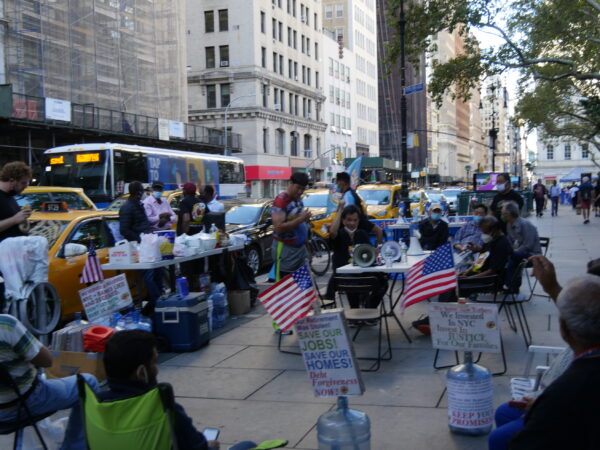
New York, NY – Eight city taxi drivers launched a hunger strike Oct. 20, demanding that Mayor Bill de Blasio add loan guarantees to the city’s revised budget, due Oct. 31, to reduce the crushing debt that owner-drivers carry.
“The city is still not responding to our call for real debt relief,” New York Taxi Workers Alliance director Bhairavi Desai said before the rally announcing the hunger strike.
Debt relief, Assemblymember Zohran Mamdani (D-Queens) told the rally, will make the difference between “merely postponing devastation and suicide and stopping it.”
Drivers chanted “We want justice/ Talk to the union.”
The hunger strike will not be like the Irish Republican Army one of 1981, in which 10 members of its Provisional faction starved to death in a British prison in Northern Ireland by refusing to eat for more than two months. The drivers and other participants will rotate, so no one damages their health.
On the other hand, Shahana Hanif, the Democratic City Council candidate in Brooklyn’s Park Slope and Kensington neighborhoods, said she was joining the strike even though she’s in remission from lupus, because “we have got to take this risk for workers.”
NYTWA and the city Taxi and Limousine Commission have competing plans to deal with the medallion-debt crisis, in which an estimated 2,500 to 4,000-plus individual owners owe far more than they can pay with their income from driving, and far more than the medallions are now worth. A 2019 survey of 450 owner-drivers by the TLC found their average debt to be $499,000.
The TLC’s Medallion Relief Program, unveiled in late August, would provide $65 million in grants to distressed owners. It would give them $20,000 for down payments to lenders to restructure loan principals and set lower monthly payments, plus up to $9,000 to help with monthly payments during the first year.
As of Oct. 16, the mayor’s office said, the program had helped 102 yellow medallion taxi owners, reducing their average debt of about $325,000 by almost half. The city-supported renegotiations with lenders eliminated the remaining debt for 21 who owed relatively small amounts, according to the TLC. More than 1,000 other owners are in the pipeline, working with the commission’s Owner/Driver Resource Center.
The TLC came up with the idea of grants for down payments last year, when, in its efforts to help drivers survive the loss of work during the pandemic, it found that having a down payment was the best leverage they had to get lenders to renegotiate, but drivers usually had to borrow the money from family or friends.
It says it has been able to reduce some drivers’ payments to less than $1,500 a month.
That level is still “not sustainable,” Desai says. Richard Chow, one of the hunger strikers, echoes that point. His lender has offered to reduce his debt by one-third, and lower his loan payments from $2,766 a month to $1,600.
“Even 1,600 dollars, I can’t afford it,” he says. “There’s not enough business out there.”
NYTWA’s proposal would give individual drivers grants of $30,000 that they would use for down payments if lenders reduced their total debt to $175,000. The city would then guarantee the other $145,000, and payments would be set at $800 a month — low enough, Desai says, for drivers to make at least minimum wage.
Lenders would still make a profit, she contends, because most “bought their loans on the secondary market for as little as $115,000.” If the driver failed to make payments on the loan, lenders could repossess medallions, and the city’s guarantee would cover the difference between the amount owed and the medallion’s market value.
Assuming a 5 percent default rate, that would cost the city $93 million over 30 years — less, Desai says, than the annual revenue from the $2.50 congestion-pricing surcharge added to fares in Manhattan south of 96th Street in 2019.
“I’ve run the numbers. This makes sense,” city Comptroller Scott Stringer told LaborPress. “This proposal will save an industry, save lives. We’ve got to go all in.”
“We must see the city’s initiative as only a beginning, and we must continue to push for additional support for the struggling individual medallion owners,” City Council Transportation Committee chair Ydanis Rodriguez (D-Manhattan) said in a statement.
Mayor de Blasio, however, said Oct. 20 that he would not go beyond the TLC plan.
“I’ve been asked many times before, could we do a full bailout?” he told a press conference. “We cannot. We’ve been really clear about that. That’s hundreds of millions of dollars.”
Rep. Alexandria Ocasio-Cortez (D-N.Y.) came out to support the drivers Oct. 21, telling them funds for debt relief had been included in the Biden administration’s American Rescue Plan in January.
“We were able to get you the money because of your action,” she said, sitting at a table with Stringer and Krishnan Shekar, the Democratic nominee for the City Council in Jackson Heights and Elmhurst.
“It’s just stuck over there,” she continued, pointing at City Hall. “Now we just need to get it out…. I think the conditions right now are very favorable to you all, and we just need to bring it home.”



